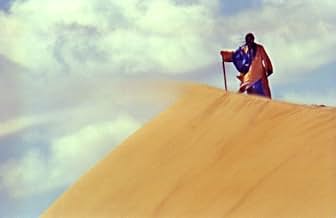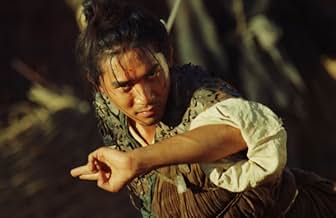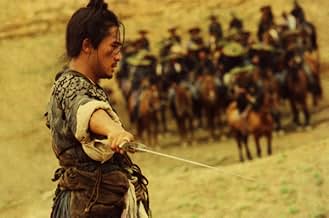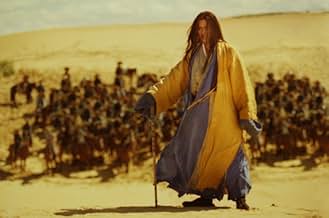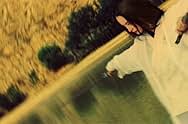NOTE IMDb
7,0/10
18 k
MA NOTE
Un tueur à gages au coeur brisé se rend dans le désert où il trouve des épéistes qualifiés pour mener à bien ses meurtres contractuels.Un tueur à gages au coeur brisé se rend dans le désert où il trouve des épéistes qualifiés pour mener à bien ses meurtres contractuels.Un tueur à gages au coeur brisé se rend dans le désert où il trouve des épéistes qualifiés pour mener à bien ses meurtres contractuels.
- Réalisation
- Scénario
- Casting principal
- Récompenses
- 9 victoires et 13 nominations au total
Tony Leung Chiu-wai
- Blind Swordsman
- (as Tony Chiu Wai Leung)
Collin Chou
- Swordsman
- (non crédité)
Li Yin
- Rebel swordsman
- (non crédité)
Avis à la une
'Dung Che Sai Duk' (aka 'Ashes of Time') is a beautiful visual tapestry. It is another fine example of poetry on canvas. The story does not follow a linear structure but at the same time the dazzling visuals grip the viewer and involve us in the characters' life. The first time I watched 'Dung Che Sai Duk' I was engaged throughout the entire duration but by the end I was left a little confused. This is because I overlooked the layers and some of the important details. It also didn't help that the subtitles were poor. After second viewing, this time with better subtitles, it became a lot more clearer and my appreciation has increased much more.
Almost the entire film is set in the desert. There are plenty of swordfights to enjoy but this is secondary to the story which is mainly about unrequited love and how the fights are a projection of their anger and way of dealing with rejection. The fight scenes are well choreographed. However, I felt slow motion was overused. The editing is good but I was disappointed that so many sequences were cut from the Redux version. The dialogues are marvelously poetic. The tricky cinematography is conducted through various angles and so astonishingly effective. The soundtrack is superb and atmospheric. The cast boasts of top talented names like, Leslie Cheung, Maggie Cheung, Brigitte Lin, Tony Leung Chiu Wai, Jacky Cheung and Carina Lau all of whom do full justice to their roles with subtle performances.
Kar Wai Wong is known for experimenting with different themes and here he does that with unrequited love. Although the treatment of the story is slightly different when compared to his other works, the same essence remains within the characters. It is a movie that stays with you and invites you to revisit.
Almost the entire film is set in the desert. There are plenty of swordfights to enjoy but this is secondary to the story which is mainly about unrequited love and how the fights are a projection of their anger and way of dealing with rejection. The fight scenes are well choreographed. However, I felt slow motion was overused. The editing is good but I was disappointed that so many sequences were cut from the Redux version. The dialogues are marvelously poetic. The tricky cinematography is conducted through various angles and so astonishingly effective. The soundtrack is superb and atmospheric. The cast boasts of top talented names like, Leslie Cheung, Maggie Cheung, Brigitte Lin, Tony Leung Chiu Wai, Jacky Cheung and Carina Lau all of whom do full justice to their roles with subtle performances.
Kar Wai Wong is known for experimenting with different themes and here he does that with unrequited love. Although the treatment of the story is slightly different when compared to his other works, the same essence remains within the characters. It is a movie that stays with you and invites you to revisit.
Without a doubt, Ashes of Time is a beautiful, deeply felt movie. The acting and cinematography are outstanding. The color and camera angles are poetic. But the DVD quality is barely acceptable and the plot, what there is of it, is very confusing. The movie is less a journey from point A to point B than it is a dream-like dance around a central theme: regret for the way we treat those we love.
For those who would watch the movie for the martial arts-- the main characters are mostly swordsmen and martial artists-- the movie is less than satisfying. The fight scenes are highly stylized, employing fast cuts, blurs of motion, and disorienting lighting and camera angles. The fight scenes are more about camera technique than martial arts technique.
Ashes of Time is not a movie that can be absorbed in one viewing. For many viewers, though, it will be worth a second or even third.
For those who would watch the movie for the martial arts-- the main characters are mostly swordsmen and martial artists-- the movie is less than satisfying. The fight scenes are highly stylized, employing fast cuts, blurs of motion, and disorienting lighting and camera angles. The fight scenes are more about camera technique than martial arts technique.
Ashes of Time is not a movie that can be absorbed in one viewing. For many viewers, though, it will be worth a second or even third.
This classic ultra-stylized and (in the words of the NYFF blurb) "insanely gorgeous" 1994 martial arts or 'wuxia' film based on the Louis Cha novel 'The Eagle-Shooting Horses' needs no introduction to film fans now, though before Tarantino's release of 'Chungking Exrpess' Americans had to go to Chinatown theaters or rent pirated videotapes to see it; I saw it in Chinatown in a double bill with 'As Tears Go By' (1988). A cinematic icon today, Wong Kar-wai didn't get international recognition till 1997 at Cannes (for 'Happy Together'), and the majority of US art-house viewers didn't notice him till 'In the Mood for Love' (2000). Now ironically since the huge blowout and exhaustion of Wong's epic '2046' (2004), a summing-up of his 60's nostalgia themes and characters, he seems to have reached a point of exhaustion, and his English-language romance 'Blueberry Nights' (2007) was a critical failure. Re-editing 'Ashes of Time' looks like another example of treading water, but it's still great to have it; many have still not seen it, and any films as visually magnificent as Wong's are best seen in theaters. It's also fortunate that all his films can be seen on decent DVD's now with readable subtitles for English speakers, instead of the weird earlier Hong Kong prints with flickering titles in Chinese and peculiar English that disappeared before you could read them. 'Ashes of Time Redux' has the best English subtitles yet both visually and linguistically.
According to Wong, 'Ashes of Time' negatives weren't in very good shape, and a search of various versions led him to a huge warehouse somewhere near San Francisco's Chinatown that contained the entire history of Hong Kong movies. He and his team put together various versions, adding a bit to what we already know, digitally cleaning up the images and "enhancing" some of the color and doing things with the sound, adding a new score and "re-arrangement" by Wu Tong including cello solos by Yo Yo Ma.
Experts will have to comb over all this to explain the differences. The cinematographer Christopher Doyle, who was present at the press screening of the film at the NYFF, doesn't like the enhancing of the color and neither do I. A lot of yellows and oranges are heightened, greenish-turquoise touches are set in, and many of the desert sand landscapes seem to have lost their surface detail. This seems unnecessary and even obtrusive, but it's not enough to spoil the experience. Other images simply look more pristine and clear. Wong wouldn't say what specific changes were made in the editing. He preferred to talk about how he adapted Louis Cha's novel and how this film relates to his oeuvre. Both for him and for Doyle it was an essential milestone. The cast features the late Leslie Cheung, both Tony Leungs (Chiu Wai and Ka Fai) and Jacky Cheung, and has Maggie Cheung as The Woman and martial arts film great Brigitte Lin as Murong Yin and Murong Yang, the sister and brother. Lin, now retired, was responsible for the revival of the genre and is central to this film, though Maggie Cheung is its diva, its dream lover.
Cha's novel is a complicated 4-volume wuxia genre epic, very popular but little known or appreciated in the West. Wong studied it carefully (and made a parody of it called 'Eagle-Shooting Heroes') but then though he says this film unlike all his others had a fixed plan (and thus made for a story full of fatalism), he threw away the story and just took a couple of the main characters and made up another simpler story imagining what the characters' lives were like when they were young. A simpler story. Well. The story has always seemed completely incomprehensible to me but after re-watching 'Redux' it obviously is nonetheless a coherent narrative; it's just intricate and, above all, cyclical. It ends as it begins, with the narrator looking into the camera and repeating the opening lines.
'Ashes of Time' was shot in the desert. Doyle had never done that. The film was long delayed and the shoot was difficult. Doyle knew nothing about martial arts or 'Jianghu,' the parallel universe of martial arts fiction. He was under extreme constraints, having very little artificial light. Nonetheless he produced some of the most beautiful sequences in modern film, because he's a great cinematographer, perhaps the greatest of recent decades, as Wong Kar-Wai is one of the defining contemporary cinematic geniuses.
Wong is notable for his meditative and arresting voice-overs. Here is a sample: "People say that if a sword cuts fast enough, the blood spurting out will emit a sound like a sigh. Who would have guessed that the first time I heard that sound it would be my own blood?" "You gained an egg, but lost a finger. Was it worth it?" There are aphorisms or bits of advice: "Fooling a woman is never as easy as you think." The film is anchored and structured by the Chinese calendar: the Chinese almanac is divided into 24 solar terms and the narrative moves forward selectively through these terms, which contain weather descriptions (naturally) and advice as to what is propitious or unlucky and in what regions and directions. There is also a great deal about oblivion and forgetfulness (which are linked with wine, including a magic wine that eliminates memory). The desert and drinking are visual touchstones throughout as are pairs, opposites, and contrasts; and there is cross-dressing and perhaps bisexual love. The images are full of flickering light. The sword fights, which do not begin until more than half way into the film, are without the acrobatic feats actually performed or digitally faked as in current martial arts films, though they are elaborately staged by the action choreographer Sammo Hung. They are a symphony of fast cutting, closeups, blurs, and slow motion (which Wong intended particularly to express the fatigue of the Blind Swordsman in the film).
According to Wong, 'Ashes of Time' negatives weren't in very good shape, and a search of various versions led him to a huge warehouse somewhere near San Francisco's Chinatown that contained the entire history of Hong Kong movies. He and his team put together various versions, adding a bit to what we already know, digitally cleaning up the images and "enhancing" some of the color and doing things with the sound, adding a new score and "re-arrangement" by Wu Tong including cello solos by Yo Yo Ma.
Experts will have to comb over all this to explain the differences. The cinematographer Christopher Doyle, who was present at the press screening of the film at the NYFF, doesn't like the enhancing of the color and neither do I. A lot of yellows and oranges are heightened, greenish-turquoise touches are set in, and many of the desert sand landscapes seem to have lost their surface detail. This seems unnecessary and even obtrusive, but it's not enough to spoil the experience. Other images simply look more pristine and clear. Wong wouldn't say what specific changes were made in the editing. He preferred to talk about how he adapted Louis Cha's novel and how this film relates to his oeuvre. Both for him and for Doyle it was an essential milestone. The cast features the late Leslie Cheung, both Tony Leungs (Chiu Wai and Ka Fai) and Jacky Cheung, and has Maggie Cheung as The Woman and martial arts film great Brigitte Lin as Murong Yin and Murong Yang, the sister and brother. Lin, now retired, was responsible for the revival of the genre and is central to this film, though Maggie Cheung is its diva, its dream lover.
Cha's novel is a complicated 4-volume wuxia genre epic, very popular but little known or appreciated in the West. Wong studied it carefully (and made a parody of it called 'Eagle-Shooting Heroes') but then though he says this film unlike all his others had a fixed plan (and thus made for a story full of fatalism), he threw away the story and just took a couple of the main characters and made up another simpler story imagining what the characters' lives were like when they were young. A simpler story. Well. The story has always seemed completely incomprehensible to me but after re-watching 'Redux' it obviously is nonetheless a coherent narrative; it's just intricate and, above all, cyclical. It ends as it begins, with the narrator looking into the camera and repeating the opening lines.
'Ashes of Time' was shot in the desert. Doyle had never done that. The film was long delayed and the shoot was difficult. Doyle knew nothing about martial arts or 'Jianghu,' the parallel universe of martial arts fiction. He was under extreme constraints, having very little artificial light. Nonetheless he produced some of the most beautiful sequences in modern film, because he's a great cinematographer, perhaps the greatest of recent decades, as Wong Kar-Wai is one of the defining contemporary cinematic geniuses.
Wong is notable for his meditative and arresting voice-overs. Here is a sample: "People say that if a sword cuts fast enough, the blood spurting out will emit a sound like a sigh. Who would have guessed that the first time I heard that sound it would be my own blood?" "You gained an egg, but lost a finger. Was it worth it?" There are aphorisms or bits of advice: "Fooling a woman is never as easy as you think." The film is anchored and structured by the Chinese calendar: the Chinese almanac is divided into 24 solar terms and the narrative moves forward selectively through these terms, which contain weather descriptions (naturally) and advice as to what is propitious or unlucky and in what regions and directions. There is also a great deal about oblivion and forgetfulness (which are linked with wine, including a magic wine that eliminates memory). The desert and drinking are visual touchstones throughout as are pairs, opposites, and contrasts; and there is cross-dressing and perhaps bisexual love. The images are full of flickering light. The sword fights, which do not begin until more than half way into the film, are without the acrobatic feats actually performed or digitally faked as in current martial arts films, though they are elaborately staged by the action choreographer Sammo Hung. They are a symphony of fast cutting, closeups, blurs, and slow motion (which Wong intended particularly to express the fatigue of the Blind Swordsman in the film).
I have my message headed with a WARNING because I don't want any readers to be misled and go rushing for this movie thinking it's like anyone of those Chinese Wuxia movies. This is not an action based movie, it only has "sword fighting" world as a background. This is what always made WKW's films different from any others'. This film has probably the least action scenes compared to any other sword fighting films made within the last 15 years.
I called it Timeless because seen again today, you don't find it outdated like some others' films. This is among the only 4 Chinese films that I will enjoy watching again every 2 or 3 years and I think this is the most "timeless" among the 4.(The other 3 are Love Eterne(Li Han Hsiang), A Touch of Zen(King Hu) and Days of Being Wild(WKW))
This is the kind of film that you know it's great even if you don't understand it. You don't need to understand its story in order to enjoy it. It's message is simply about "memories" and "regrets". It said something like "Regrets is the most painful feeling" and "regrets and unhappiness because of memories".It's the most complicated among WKW's 7 or 8 films(till 2046 and Eros). I don't fully understand it during the first viewing but I was totally surprised and mesmerized. I am the type that will consider a film good only if after watching, surprised me and felt that i could not thought of such a film. If I can expect or imagine a film's outcome, I will not call it great. Even after 4 viewings now, I am not totally sure I have figured out all its sequences yet but it doesn't matter. Some of the scenes and editions are paced so fast that you may not recall seeing it. Just like his recent 2046. This is the work of a brilliant director,because you need more than 1 viewing to fully get it so you must buy a copy for future viewing. Heard that even the Venice Filmfest Jury has to give it a prize although they don't understand what's it about.
Those who don't know how to appreciate a good film may not understand a WKW film as he seldom stick to a particular genre, his films' genre is simply WKW and it's all about sights and sound in WKW-style. Original, stylish and trend setting. After his Ashes of Time and Fallen Angels swept all the major awards during the HK Film Awards in the same year, 2 most prominent HK directors changed style and tried to follow WKW-style but both failed(Tsui Hark in Dao(Blade) and Stanley Kwan in Hold Me Tight.
WKW has mentioned that movies, to him is most is sights and sound and we see it clearly in this film. The music and the cinematography is the best.
Those who don't like WKW films may criticize that he don't has a script or don't know what he wants until the final edition. I totally disagree. I think WKW always know what he wants and completed the film just the way he wants it, otherwise how could all his films are being so well received by critics ?. As for the viewers, what we want is the finished work. We don't care the original idea or the casts. We only care for the outcome. I mentioned it because this film took 2 years to complete and along the way, plot and actors have changed.
Leslie Cheung - nominated for best acting here but I find him better in 2 other WKW films, Days of Being Wild and Happy Together(WKW won best director at Cannes). Brigitte Lin is superb in a dual character role/s. Tony Leung and Carina Lau are always good(usually and only) in WKW films. Maggie Cheung(unbilled) has her best 2 single take shots(her fans must keep this.) Even pop idol Michelle Yeung who never act well appeared like she acted.
I strongly recommend this film to any film student or critics. Those who like "2046" or Tsui Hark's The Blade will like it. This is not WKW's best but I consider it his most UNIQUE. Like any other WKW movies, it's a collectors' item and a future classic, if not already one.
I called it Timeless because seen again today, you don't find it outdated like some others' films. This is among the only 4 Chinese films that I will enjoy watching again every 2 or 3 years and I think this is the most "timeless" among the 4.(The other 3 are Love Eterne(Li Han Hsiang), A Touch of Zen(King Hu) and Days of Being Wild(WKW))
This is the kind of film that you know it's great even if you don't understand it. You don't need to understand its story in order to enjoy it. It's message is simply about "memories" and "regrets". It said something like "Regrets is the most painful feeling" and "regrets and unhappiness because of memories".It's the most complicated among WKW's 7 or 8 films(till 2046 and Eros). I don't fully understand it during the first viewing but I was totally surprised and mesmerized. I am the type that will consider a film good only if after watching, surprised me and felt that i could not thought of such a film. If I can expect or imagine a film's outcome, I will not call it great. Even after 4 viewings now, I am not totally sure I have figured out all its sequences yet but it doesn't matter. Some of the scenes and editions are paced so fast that you may not recall seeing it. Just like his recent 2046. This is the work of a brilliant director,because you need more than 1 viewing to fully get it so you must buy a copy for future viewing. Heard that even the Venice Filmfest Jury has to give it a prize although they don't understand what's it about.
Those who don't know how to appreciate a good film may not understand a WKW film as he seldom stick to a particular genre, his films' genre is simply WKW and it's all about sights and sound in WKW-style. Original, stylish and trend setting. After his Ashes of Time and Fallen Angels swept all the major awards during the HK Film Awards in the same year, 2 most prominent HK directors changed style and tried to follow WKW-style but both failed(Tsui Hark in Dao(Blade) and Stanley Kwan in Hold Me Tight.
WKW has mentioned that movies, to him is most is sights and sound and we see it clearly in this film. The music and the cinematography is the best.
Those who don't like WKW films may criticize that he don't has a script or don't know what he wants until the final edition. I totally disagree. I think WKW always know what he wants and completed the film just the way he wants it, otherwise how could all his films are being so well received by critics ?. As for the viewers, what we want is the finished work. We don't care the original idea or the casts. We only care for the outcome. I mentioned it because this film took 2 years to complete and along the way, plot and actors have changed.
Leslie Cheung - nominated for best acting here but I find him better in 2 other WKW films, Days of Being Wild and Happy Together(WKW won best director at Cannes). Brigitte Lin is superb in a dual character role/s. Tony Leung and Carina Lau are always good(usually and only) in WKW films. Maggie Cheung(unbilled) has her best 2 single take shots(her fans must keep this.) Even pop idol Michelle Yeung who never act well appeared like she acted.
I strongly recommend this film to any film student or critics. Those who like "2046" or Tsui Hark's The Blade will like it. This is not WKW's best but I consider it his most UNIQUE. Like any other WKW movies, it's a collectors' item and a future classic, if not already one.
Although I enjoy them, I seldom re-watch slow and introspective movies. Ashes of Time is the exception to the rule, as it haunts me so much that I have already given it three viewings! It may be because of the wonderful pictures, the essential yet poignant dialogues or the grave & epic music, nevertheless Ashes of Time is a fascinating movie!
Set in a tavern in the middle of the desert, it tells us stories of different swordsmen and deals with the theme of unrequited love. All the people, in fact, had to face a rejection.. and now strive to find a way to overcome the delusion and go on with their life. Swordsmanship is mostly viewed as an outlet to bring out the inner passions and frustrations.
The protagonist, Ouyang Feng [Leslie Cheung] is one of those swordsmen, who left his lady [Maggie Cheung] and his village to pursue fame and glory, convinced that she would have waited for him to return. Now instead he faces loneliness and the fact that she has married his elder brother.
The most peculiar aspect of the movie is the pictures, so beautifully shot that each still can make a wonderful portrait. Even the battles, rather than being filmed continuously, are rendered as a sequence of separate shots, thus remaining more indelibly impressed in our head. Indeed, the movie also focuses about memory (whom the movie title probably refers to) and its power to keep alive moments of the past, that otherwise would perish in the flow of time. Highly recommended! 9/10
Set in a tavern in the middle of the desert, it tells us stories of different swordsmen and deals with the theme of unrequited love. All the people, in fact, had to face a rejection.. and now strive to find a way to overcome the delusion and go on with their life. Swordsmanship is mostly viewed as an outlet to bring out the inner passions and frustrations.
The protagonist, Ouyang Feng [Leslie Cheung] is one of those swordsmen, who left his lady [Maggie Cheung] and his village to pursue fame and glory, convinced that she would have waited for him to return. Now instead he faces loneliness and the fact that she has married his elder brother.
The most peculiar aspect of the movie is the pictures, so beautifully shot that each still can make a wonderful portrait. Even the battles, rather than being filmed continuously, are rendered as a sequence of separate shots, thus remaining more indelibly impressed in our head. Indeed, the movie also focuses about memory (whom the movie title probably refers to) and its power to keep alive moments of the past, that otherwise would perish in the flow of time. Highly recommended! 9/10
Le saviez-vous
- AnecdotesThis film had an exhausting effect on Wong Kar-Wai. While on hiatus during the editing process he wrote and shot Chungking Express (1994) to "clear his head".
- Citations
Ou-yang Feng: People say, when you can't have what you want, the best you can do is not to forget.
- Versions alternativesWong Kar-wai revisited the film and created the Redux version which premiered at the Cannes Film Festival 2008. This version has alternative footage and changes in the order of scenes. The Redux version has new opening titles, and the season's fade-ins introducing each chapter are new. It also has a new color-scheme and a new soundtrack. Some scenes from the original version have been deleted, for example the two main character's introduction in the beginning. The overall run time of the Redux version is slightly shorter than the original theatrical version.
- ConnexionsFeatured in Century of Cinema: Naamsaang-neuiseung (1996)
Meilleurs choix
Connectez-vous pour évaluer et suivre la liste de favoris afin de recevoir des recommandations personnalisées
Détails
Box-office
- Budget
- 40 000 000 HKD (estimé)
- Montant brut aux États-Unis et au Canada
- 174 273 $US
- Week-end de sortie aux États-Unis et au Canada
- 21 372 $US
- 12 oct. 2008
- Montant brut mondial
- 2 009 694 $US
Contribuer à cette page
Suggérer une modification ou ajouter du contenu manquant

Lacune principale
By what name was Les cendres du temps (1994) officially released in India in English?
Répondre






